#labourously. just to get a scratch of understanding. he's me. i'm him. we're the same and i'm fucking crying
Explore tagged Tumblr posts
Text
God I relate to Evan Kelmp on such a deep level. I, too, say and do vastly unsettling things due to a life lived unsafely. I, too, upon getting my hands on some decent money for the first time, bought a good pair of boots and religiously cared for them. I carried a knife or a chain wherever I went, just in case. I had my life in a bag on my back, just in case. I feel such a deep attachment to my home, but am always prepared to lose it. I am always thinking of the worst possible way things could go, so I'm prepared, but am always delighted when things go well instead. I adore the people I love, I hold on with claws, and even when they hurt me, I let it go over and over and over, because I love them; and I would die for them, if they asked. I, too, would lose myself in the mindless violence of stomping out a creature formed punching bag, where it is morally fine to do so, and I could do so freely. I, too, hold so much rage in my soul at the pure injustice of the world, of my life, that I am burning from the inside out; and I too, choose to be kind and patient first, because god I wish someone would have done that for me.
I never expected another season of Misfits and Magic, but fuck am I glad it's here. My weird little bird facts guy, who survived by clawing his way through hell, I love you Evan Kelmp, and your uncomfortable last name.
#dimension 20#evan kelmp#mismag#d20 mismag#d20 misfits and magic#brennan lee mulligan#d20#radio speaks#i love him#it's not often i see a genuine and loving portrayal of cptsd and autism and everything else evan has going on#he brings me such a peace that i've never felt before#like being seen and understood for the first time ever#without having to explain in great detail#labourously. just to get a scratch of understanding. he's me. i'm him. we're the same and i'm fucking crying#sobbing#my boy
105 notes
·
View notes
Text
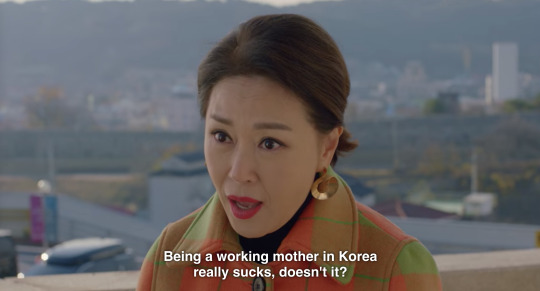
So much of this episode is about the unacknowledged labour of women, the sexism they face in different areas and the various methods women adopt to negotiate it.
Ji-Woo is such a great character because the show takes the idea of a film star and layers it with angularities and tenderness. She's well aware of what she's sacrificed on the personal front to become the successful professional she is in the present. I love how she's neither ashamed of it nor does she ignore that its a choice that came with lots of unpleasant baggage. We get a sense of this awareness in the conversation she has with Seon-Gyeom in the parking lot (it's also striking me as I rewatch the show that there's a beautiful little arc of Seon-Gyeom and Ji-Woo building a mother-son relationship almost from scratch).
The church scenes are also a great example of show-don't-tell storytelling. While Assemblyman Ki has to bribe and flatter people in order to get their attention, adoring gazes turn to Ji-Woo seemingly automatically. Except of course, it's not automatic, as the conversation with Ms Dong reminds us. Her fame as an actress is the result of hard work and putting everything else aside. I love the easy understanding between Ms Dong and Ji-Woo — both working women, both mothers. There's no shame in Ji-Woo asking Ms Dong to look out for Seon-Gyeom and no recrimination when she says Seon-Gyeom is closer to Ms Dong than he is to his mother. It takes a village, people.
In Ji-Woo and Seon-Gyeom's chance meeting at the parking lot, there's something tentative and formal about them. They're both putting up façades — Seon-Gyeom's polite mask, Ji-Woo's tinkling laughter — although she does allow him to glimpse what lies beneath. Ji-Woo only drops a vague mention of Assemblyman Ki making life miserable for the rest of the family because Seon-Gyeom isn't falling in line. It's obvious from both mother and son's body language that she doesn't need to elaborate. What's lovely though is that there's no complaint in her tone. She isn't telling Seon-Gyeom this detail so that he feels guilty; quite to the contrary. The laughter and ease of her body language is reassuring, as though she's subtly telling him that she can handle this.
While we're on Ji-Woo, how great is her barely-concealed impatience with all the smiling and greeting and praying in church!
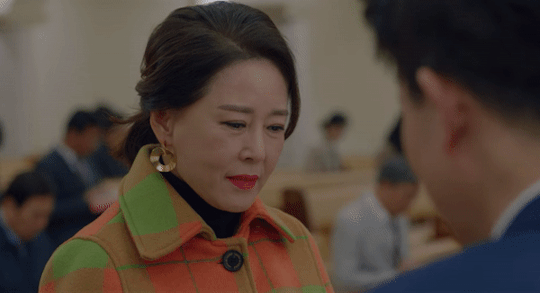
I'm not sure what I love more — the shot of a the stained-glass Jesus, looking pained while the minister thunders out a prayer for Assemblyman Ki; or the fact that the very next scene shows a kid throwing a tantrum in a supermarket. It cannot be a coincidence that this is the one time that Seon-Gyeom is filmed from an angle that makes it look like he's descending down upon the kid (whom he bribes with a chocolate bar). Particularly love the longing on the kid's face as she stares at the retreating figure of the divine Seon-Gyeom.
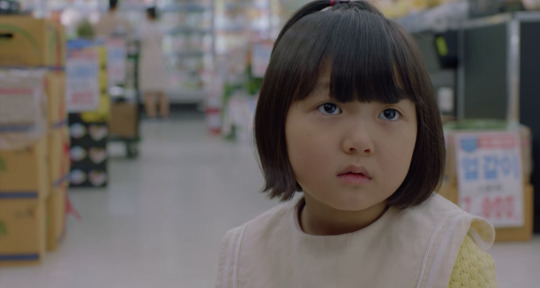
The scene between Mi-Joo and Seon-Gyeom outside his hotel is so heartbreaking to watch and it's the first time we understand just how hard Mi-Joo is on herself. All this began with a drunk professor making offensive, sexist comments that demeaned Mi-Joo, but to explain all that to Seon-Gyeom feels almost indulgent so she takes the blame. She's the disappointment — for being poor, for being seen as someone who can be bribed, for having taken the money. She doesn't hear him when he places the onus of the blame on his father. It's so achingly obvious that all her belligerence is posturing and she's ending the budding relationship between her and Seon-Gyeom because she doesn't think she deserves him.
Thank the gods for May. Even if she and Mi-Joo start off at odds, it takes only seconds for them to be in sync. God bless the womance.
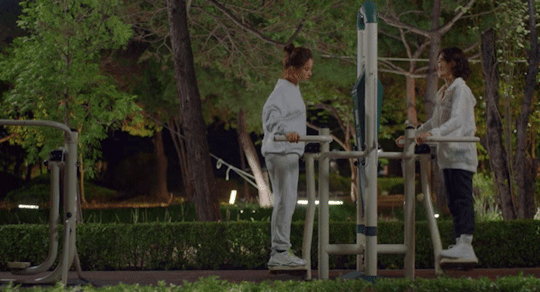
You've got to feel thankful for the family of choice when Dan-Ah bumps into human-trash brother. He's a strong reminder of the everyday sexism in society and how privilege doesn't mean you're protected from this venom.
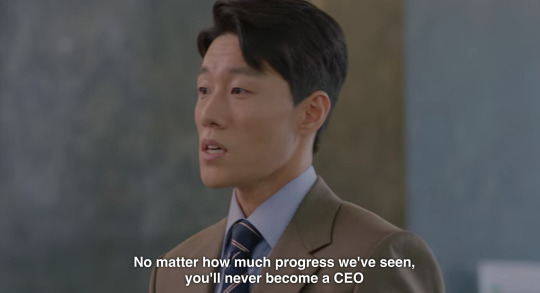
Over the course of Run On, Dan-Ah figures out how to fight her battles in her own way, rather than by employing toxic methods, like putting her (half-) brothers down because society considers them illegitimate. At this point though, while her brother is disgusting and Dan-Ah is obviously nothing like him as a person, the weapons she uses to fight him — hierarchy, contempt, violence — are the same as those he uses on her.
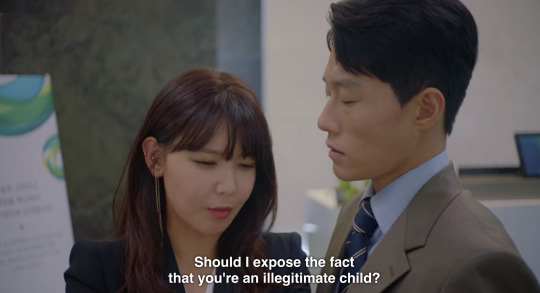
In the middle of all these tortured, messed-up men, the kids are alright. We know this from not only the way the schoolkids whom Seon-Gyeom coaches react to the bullying scandal — interesting that the children have more perspective than the grown-ups who care about appearances rather than the truth — but also thanks to Yeong-Hwa.
I love Dan-Ah trying to subtle suss out exactly how young Yeong-Hwa is when he and Ye-Joon come to Dan-Ah's office. I also love how not for a second does Yeong-Hwa, for all his puppy-eyes, call her "noona". There's no ambiguity about this relationship. Also, while I still can't find anything remotely good to say about those wretched paintings, the idea that art forges connections irrespective of social convention/ hierarchy is one that has my heart.
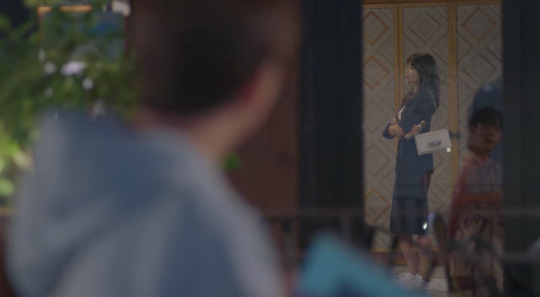
If the Gyeommi couple is all about being heard and understood, the Danhwa couple is all about being seen for what you really are.
Speaking of Gyeommi, how cute is it that Woo-Sik is the one playing Cupid! In this episode, Seon-Gyeom is frequently reminded of how alone and solitary he is, but what we also see is that he's building friendships. The relationship with Woo-Sik changes from that of a senior with a junior colleague to something softer, warmer. With Mi-Joo, particularly at the dinner that Woo-Sik organises, you see Seon-Gyeom finding companionship as they attempt to set aside their attraction and actually understand each other. This is a relationship that works because they're so different. The fact that they don't think alike is why she can offer him the piercing insight of, "Why not include your failures as a part of your process?"
Also, what a bombshell to drop on audiences in a country (and continent) known for its fiercely competitive spirit... .
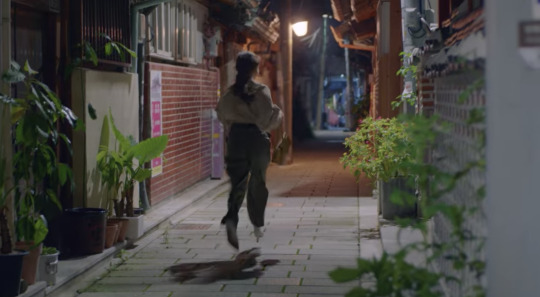
Rewatching this episode, Mi-Joo running back to home to translate the article in which Woo-Sik clears Seon-Gyeom's name reminded me of how different this is from the marathon run. Both times, she's running towards Seon-Gyeom, but this time it's more adrenaline than anything else and it's for him. It's the unthinking running that Seon-Gyeom told her about during their first drinking session — you're just running ahead, without looking back, focused on one external goal. The marathon run is much more internal as it pushes Mi-Joo to make peace with her past before she decides what she wants to run towards.
Also, looping back to that idea of unacknowledged women's labour, Mi-Joo works HARD to make sure the article goes viral and she claims no credit for it. She only tells an online group that she translated it because she knows that they will circulate it with more gusto if they know it's her work. This little snippet is also a good reminder that rarely do things go viral without a whole lotta effort from people in the background.
Finally, this hug in the rain turned me into full mush. By now, we know that Seon-Gyeom has grown up with very little affection. He prefers a hotel room to the family house. The only person he's felt comfortable enough to hug is the housekeeper. As far as he can tell, he has no friends (Woo-Sik and Yeong-Il will eventually set him straight on that account, but for now, he's utterly alone). At this point, the hug from Mi-Joo is something much more tender and basic than romantic love or sexual chemistry.

MJ: Don't tell me you don't know what I'm doing.
SG: I know. You're comforting me.
MJ: Correct.
I can't help but remember the later scene when they'll be on either sides of metal gates, when she won't reach out to him and he'll be upset that she won't trust him. Perhaps that's the difference between finding friendship and falling in love — they both can make you stronger, but the process is very different.
50 notes
·
View notes